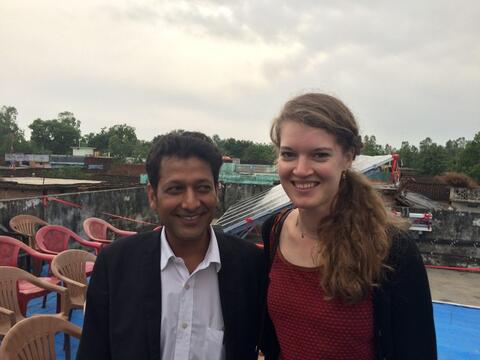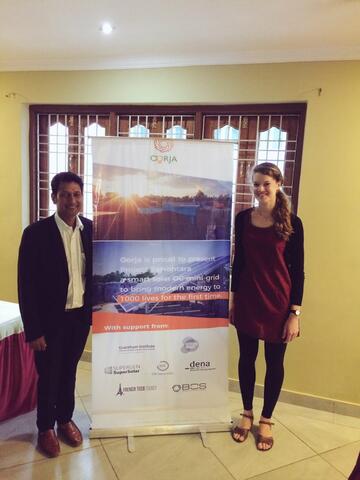
Oorja’s mission is to provide clean energy access to the 450 million people without access to reliable electricity in rural India whilst promoting sustainable local economic development.
Since mid-2015, Co-Founder Clementine Chambon has been involved in rural electrification using renewable sources through Oorja, a company based in the UK and in India that she established with Amit Saraogi, an Indian social entrepreneur. Clementine’s research interests lie in bio-fuels and off-grid electricity provision using biomass such as agricultural residues, woody biomass and energy crops.
Oorja’s aim is to deploy decentralized energy systems known as ‘mini-grids’ to provide affordable and reliable electricity to off-grid and under-electrified communities in rural India. They use locally available crop waste and solar energy as resources to power rural communities. The hybrid solar and biomass-powered micro-grids will provide affordable and reliable electricity for commercial power and household lighting, with a focus on productive uses of electricity while low-income households in nearby villages are cross-subsidized so that everyone can benefit.
Notably, the team have just recently installed the first microgrid in rural Uttar Pradesh. The common theme of all these efforts is using biomass residues to mitigate climate change, by displacing fossil fuels and reducing CO2 emissions in the energy, chemicals and transport sectors.
Clementine has also just completed her PhD in the Department of Chemical Engineering at Imperial College London earlier this year.
There are several challenges associated with utilising biomass, particularly ‘wastes’ such as agricultural residues which have many competing uses, including as animal fodder, firewood or as a building material. However, many of these residues, such as rice husk and straw, are abundantly available with millions of tons produced in surplus each year, and supply chains for these materials are being developed. Working on energy access in remote, rural areas of India brings its own set of external obstacles, such as mistrust by farmers in changing agricultural practices, caste dynamics, social and cultural barriers in rural markets and difficulty in changing consumer behaviour.
To overcome these challenges the Oorja team work closely with local field partners (social enterprises, NGOs, civil society organisations) and local government to leverage their existing networks and positions of trust. The regulatory framework for the rural energy sector in India can also present bureaucratic hurdles. Decentralized energy systems are gaining currency, however, and the team are taking Ministries in the government as partners and forging strong connections with local governing authorities.
Oorja believe clean energy provision is fundamental to poverty reduction and a critical enabler of sustainable development, stimulating better education and health, agricultural practices, women’s empowerment and the local economy with opening of new micro-enterprises and creation of jobs. They have been preparing for pilot implementation and now that it is operational they will help address challenges of energy poverty, livelihood opportunities and use of hazardous and polluting fossil fuels simultaneously. Some of the metrics they will use to measure impact are increase in energy access in households, businesses and institutions; number of jobs generated (gender disaggregated); change in household and farmers’ income; change in learning outcomes; change in incidence of respiratory diseases; and lifecycle avoided GHG emissions.
The changes in rural settings upon uptake of clean energy can be remarkably drastic. A few months ago, an Oorja team member met Rukmani from Girant village, their first potential plant operator. As the team integrate her into the value chain with the launch of their pilot DC solar mini-grid this year, she will bring extra income to the family, replace her kerosene lamp with LED bulbs powered by clean and affordable power and live with dignity. Her two children will be able to study after dark, improving their academic outcomes; her husband, a marginalized farmer with less than two acres of land and earning less than $2 a day will be able to replace the operationally expensive diesel pump with solar powered pump to irrigate his land.

When speaking with Clementine, she noted “our proudest achievement I would say is yet to come when our pilot mini-grid will be installed and commissioned in June 2017 to provide clean and affordable electricity to 100 households and 50 farmers in an off-grid village in India. We will celebrate when the first lights are switched on and we see the smiles on the faces of the community members. However, everything that has gone into making this a reality such as conducting research, demand forecasting, selecting the pilot site, designing the grid, fostering the right technical and academic partnerships, raising the finances, procuring the equipment and working on implementation has been immensely rewarding and exciting.”
Clementine and Amit have received quite a bit of recognition for their work with Oorja in the last couple of years. In June 2015 they received the prestigious Echoing Green Climate Fellowship, comprising of a grant of US$90,000 given to the best next-generation social entrepreneurs working on mitigation or adaptation to climate change. They also received an Althea-Imperial runner-up prize that year, presented to the most innovative student entrepreneurs in science and technology at Imperial.
Last year they were one of 10 energy start-ups out of over 3,000 applicants at the Hello Tomorrow Global Summit in Paris and also among the Top 20 companies out of over 1300 applicants to MassChallenge UK, an esteemed accelerator for early-stage start-ups.
More recently, they were selected to participate in the French Tech Ticket incubation programme in Paris with funding and other support from the French government.
On the academic side, the team hopes to continue collaborating with researchers at Imperial College London to monitor and evaluate the techno-economics and social and environmental impacts of their rural electrification work. They believe that it is really important that the knowledge gained through deploying these off-grid energy systems can be shared with other stakeholders in the clean energy sector so that they can expand their reach, particularly as the number of off-grid citizens is over 230 million in India alone, and over 1.3 billion people globally.
On the entrepreneurial side, after their first mini-grid was successfully installed, their aim is to obtain seed funding from institutional investors to scale up their efforts and install hundreds of mini-grids over the next few years. They endeavour to expand access to clean energy using renewables in rural India and to reach over 1 million citizens in the next five years.
Support the Oorja crowdfunding campaign!
Oorja is now crowdfunding to raise £25,000 to cover the costs of installing six community solar pumps in Assam. The Oorja team would be very grateful for your help in spreading the news and supporting the campaign on their Indiegogo campaign.
You can keep track of their progress by visiting www.oorjasolutions.org, or contacting the team via email.